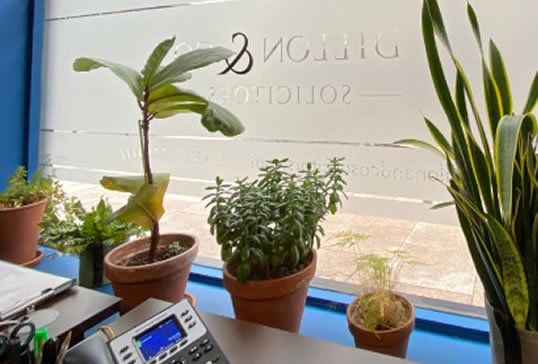HOW CAN WE HELP?
We are a law firm who provide a down-to-earth practical approach to our clients' needs, no matter what the complexity.
With our expertise and know-how, we'll help you save money, reduce stress, and focus on the priorities. for you.
We pride ourselves on our trusted, approachable team of experts who can help with your legal needs...
We provide expert advice and exceptional services to individuals, small businesses and corporate clients. Our services are tailored to the unique needs of each client. We work as part of your team, understanding your needs and what matters to you.
| Why Choose Us? | |
|---|---|
| ✓ Trust | ✓ Expertise |
| ✓ Accuracy | ✓ Experience |
| ✓ Confidentiality | ✓ Professional |
Dillon & Co. News

In recent years there has been new research and development aimed at developing legal technology to improve litigation systems and procedures available to commercial barristers and solicitors. Through data analytics and machine learning, and using systems such as the iManage system, commercial barristers hope that future costs, length and results of litigation cases will be predicted more accurately. Law firms have also announced partnerships with academic institutions such as the London School of Economics and University of Liverpool to manage litigation risk and develop models to predict case outcomes. This follows an increase in the use of machine learning and AI (artificial intelligence) to improve client services and case management. There has also been increased use of blockchain technology by commercial lawyers (a ‘blockchain’ is a continuously growing list of records, called blocks, which are linked and secured using cryptography). The technology can be used in smart contracts to reduce the steps needed to draft agreements. Hyperledger, for example, another development of blockchain technology, is being used to reduce insurance fraud. These developments will, of course, inevitably raise regulatory and data protection issues, especially in light of the coming into effect of the EU’s General Data Protection Regulation later this year. The AI revolution taking place within the legal industry looks set to continue particularly with the increase in commercial litigation. AI and legal technology will enable commercial lawyers to process documentation and contracts by, for example, identifying relevant words and names within millions of pages of documents in a much shorter time than it would take to do manually. AI can be used to scan and interpret documents and contracts and essentially allows decisions to be made with minimum human input. By better managing litigation risk, commercial lawyers will be able to advise clients better and make decisions based on decision science and actuarial expertise.

Businesses in Ireland are, in general, subject to a variety of taxes. Tax levels are normally set in the National Budget, which is published in December of every year. It is your responsibility, as the business owner, to ensure that proper books and records are kept, that your business is tax compliant and that tax returns are made annually. Failure to do so can result in fines in the form of interest and penalties being applied to unpaid and undeclared returns and the risk of publication of names of defaulters. The main elements of tax include: Income Tax - On the profits of Sole Traders and Partnerships Corporation Tax - On the profits of Limited Companies Value Added Tax (VAT) - All businesses with turnover in excess of €75,000 (goods) or €37,500 (services) PAYE/PRSI - Businesses having employees, including owner/ directors VAT Rates The rates of VAT in force at present are 4.8% (on livestock), 9%, 13.5% and 23%, depending on the goods or services in question. Certain goods and services are exempt from VAT. In general, persons supplying such goods and services e.g. schools, universities and hospitals, are treated as being exempt for VAT purposes. Tax Registration As a small business owner, you are responsible for registering your business for tax purposes with the Revenue Commissioners, there will be different forms to complete depending on the type of business entity you are going to establish. Visit www.revenue.ie for further information. Rates of Corporation Tax 12.5%: Trading income (see Guidance on Revenue Opinions on the Classification of Activities as Trading). 25%: Non-trading income [includes income chargeable under Case III (e.g. discounts, interest, foreign income), Case IV (patent royalties, miscellaneous income) and Case V (rental from land and buildings in the State) of Schedule D]. Also included at this rate is income from activities that consist of working minerals, petroleum activities and dealing in, or developing land, other than construction operations.

The current situation, where millions of employees are working from home, looks unlikely to change any time soon. So what steps can employers take to plan for this new long-term reality? What a difference a year makes. This time 12 months ago, employers and employees alike had no idea of the upheaval that was to come. We are now six months into a dramatically changed working environment that continues to evolve. Much work is going into finding a COVID-19 vaccine, but until one is developed and made widely available, we need to accept that the current situation is unlikely to change. For that reason, it’s interesting to make some educated guesses as to where employers will find themselves in September 2021 and how they should prepare for what lies ahead. The most obvious consequence of COVID-19 is the dramatic change in how we work. While certain sectors – construction, retail and hospitality, for example – are locked to a particular location, the same is not true for many others. There is every chance that millions of employees will still be working from home by this time next year, even if a safe vaccine is discovered in the meantime. The longer home working continues, the more difficult it will be to change. Any employer with an eye on the future should plan accordingly. Employees are already seeing the benefits in terms of reduced or cancelled commutes, convenience and more time to spend with family. Employers, in turn, are hopefully seeing a more motivated workforce and greater productivity. International tech companies based in Ireland have already announced that their employees can work from home for the foreseeable future, and they are by no means outliers. So what should employers be thinking about, and planning for, now? 1. To begin with, it’s worth remembering the employer’s obligation to maintain a safe place of work exists, irrespective of whether an employee is working from home or in a physical office. All Irish employers have a duty to identify hazards and assess risks in the workplace, and to take whatever steps are necessary to reduce or eliminate them. Obviously, particularly in the case of larger organisations, it is going to be extremely difficult to carry out bespoke health-and-safety inspections in individual employees’ homes. An employer with an eye on 2021 should instead think about practical ways to ensure health and safety. They could, for example, circulate dedicated remote-working policies providing guidance on safe working. A prudent employer will, similarly, invest in home office equipment, particularly ergonomic-friendly chairs. Other practical steps might include checking in regularly with staff, circulating questionnaires and reminding employees of the need to take work breaks. All of these steps will go a long way towards forestalling problems. 2. Employers should place an emphasis on the security of data. The risks of sensitive data being seen by unwelcome eyes is obviously greater in circumstances where employees are working from multiple locations. Again, simple precautionary steps are key. Employers should ask themselves whether their data security is adequate? Do employees know that the onus is on them to ensure that devices are kept securely? Are there disaster recovery plans in place? 3. One thing to remember is that, even with the majority of workers at home for the majority of the time, a physical office will likely still be necessary. Certain client meetings, to take an obvious example, will need to be face to face. Employers need to ensure that the physical office is COVID-19-compliant. As well as that, moving to a system of hot-desking will take time to implement, so why not start planning now? 4. Employers should also think in more nebulous terms. We moved, practically overnight, from an environment in which staff met colleagues every day to one in which they are working in isolation. If remote working continues to be the norm, this is likely to continue. The advantages of remote working shouldn’t be underestimated, but neither should the disadvantages. Clinical psychologists worldwide have flagged the risks of isolation and, again, there are simple and practical steps employers can take to alleviate those risks. These include actively encouraging staff to socialise, even remotely. There’s no reason why employers can’t regularly schedule Zoom or Teams meetings purely for the purpose of catching up, for example. Similarly, subject to social-distancing rules, employers should consider regular in-person meetings at their premises. Replicating the social aspects of the office, while more challenging than in the past, is by no means impossible. Times of adversity always bring sweeping change with them, and COVID-19 is proving to be no exception. That said, even if we are in a brave new world in September 2021, it doesn’t have to be a daunting one.







